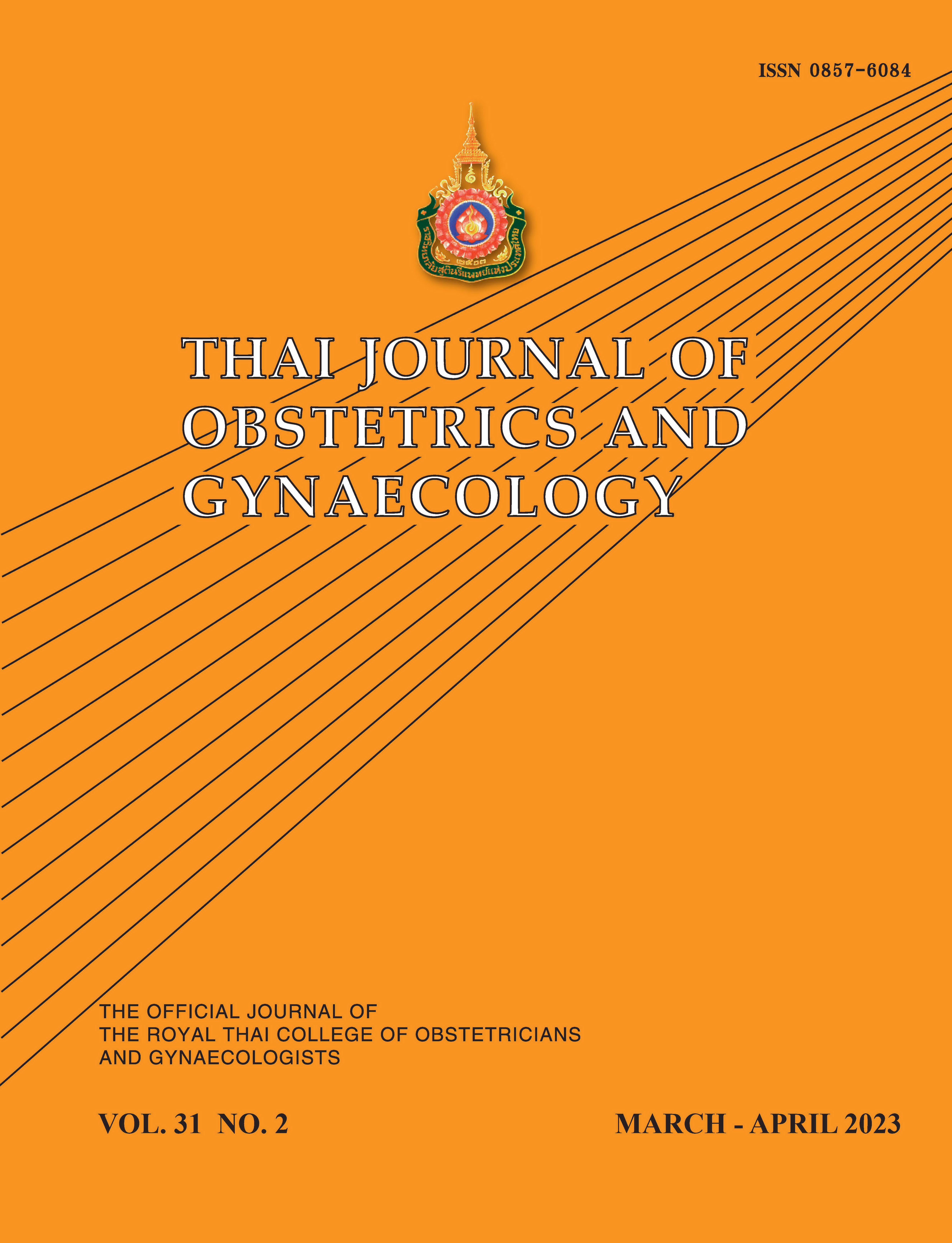Intrapartum Maternal Capillary Blood Glucose in Diabetic Pregnancy and Risk Factors Associated with Neonatal Hypoglycemia
Main Article Content
Abstract
Objectives: To find an association between intrapartum maternal capillary blood glucose in diabetic pregnancy and neonatal hypoglycemia, and find the factors affected by this condition.
Materials and Methods: The study was a retrospective cohort study of 677 cases of diabetic pregnancies, delivered at Hatyai Hospital from October 2016 to September 2019. The primary outcome was to find an association between intrapartum maternal capillary blood glucose in diabetic pregnancy and neonatal hypoglycemia. The secondary outcome was to find factors that may be associated with neonatal hypoglycemia. Multiple logistic regression was used for analysis which quantifies the magnitude of association. Adjusting for covariates was done. The association was expressed as odd ratio and was interpreted as significant at p value < 0.05.
Results: From 677 cases reviewed, pregestational diabetes mellitus was 67 cases (9.90%) and gestational diabetes mellitus was 610 cases (90.10%). Neonatal hypoglycemia was recorded at 64 cases (9.45%). Following analysis, we found that a high level of capillary blood glucose of more than 110 mg/dL during intrapartum periods in diabetic pregnancy was associated with neonatal hypoglycemia (adjusted odds ratio (aOR) 2.46, 95%CI 1.40-4.32, p = 0.002). Cesarean delivery was also associated with this condition (aOR 4.04, 95% CI 2.15-7.55, p < 0.001).
Conclusion: Intrapartum capillary blood glucose levels exceeding 110 mg/dL and cesarean delivery in diabetic pregnancy were associated with neonatal hypoglycemia.
Article Details

This work is licensed under a Creative Commons Attribution-NonCommercial-NoDerivatives 4.0 International License.
References
Diabetes Association of Thailand. Clinical Practice Guideline for Diabetes 2017. Bangkok: Diabetes Association of Thailand; 2017.
Sangsawang T, Roonghiranwat T, Bongsebundhu-phubhakdi C, Kongkanka C. Incidence and risk factor of hypoglycemia in high risk in neonatal unit of Prapokklao Hospital, Chanthaburi Province. J Prapokklao Hosp Clin Med Educat Center 2018;35:268-76.
Alemu BT, Olayinka O, Baydoun HA, Hoch M, Elci MA. Neonatal hypoglycemia in diabetic mothers: a systemic review. Curr Pediatr Res 2017;21:42-53.
Bromiker R, Perry A, Kasirer Y, Einav S, Klinger G, Levy-Khademi F. Early neonatal hypoglycemia: incidence of and risk factors. A cohort study using universal point of care screening. J Matern Fetal Neonatal Med 2019;32:786-92.
Kole MB, Ayala NK, Clark MA, Has P, Esposito M, Werner EF. Factors associated with hypoglycemia among neonates born to mothers with gestational diabetes mellitus. Diabetes Care 2020;43:e194-5.
American College of Obstetricians and Gynecologists. Pregestational diabetes mellitus. ACOG Practice Bulletin No 201. Obstet Gynecol 2018;132:e228-48.
American College of Obstetricians and Gynecologists. Gestational diabetes mellitus. ACOG Practice Bulletin No 190. Obstet Gynecol 2018;131:e49-64.
Edwardina MG, Zarinah RG. Association of intrapartum maternal blood glucose control and neonatal hypoglycemia in a private tertiary hospital. Philipp J Obstet Gynecol 2016;40:1-8.
Fleischman A, Kim B, Ashley NB. The association between intrapartum maternal glycemic control and neonatal hypoglycemia. Am J Obstet Gynecol 2020;222:S493-4.
Yamamoto JM, Benham J, Mohammad K, Donovan LE, Wood S. Intrapartum glycemic control and neonatal hypoglycemia in pregnancies complicated by diabetes: a systemic review. Diabet Med 2018;35:173-83.
Adamkin DH. Clinical Report-postnatal glucose homeostasis in late-preterm and term infants. Pediatrics 2011;127:575-9.
Martin JA, Hamilton BE, Osterman MJ, Driscoll AK, Mathews TJ. Births: Final data for 2015. Natl Vital Stat Rep 2017;66:1.
Warunpitikul R, Aswakul O. The incidence of diabetes mellitus in pregnancy woman and its outcomes between pregnant women with diabetes mellitus and non-diabetes mellitus at Maharat Nakhon Ratchasima Hospital. Thai J Obstet Gynaecol 2014;22:81-7.
Joshi T, Oldmeadow C, Attia J, Wynne K. The duration of intrapartum maternal hyperglycaemia predicts neonatal hypoglycaemia in women with pre-existing diabetes. Diabet Med 2017;34:725-31.
Cordua S, Secher AL, Ringholm L, Damm P, Mathiesen ER. Real-time continuous glucose monitoring during labour and delivery in women with Type 1 diabetes - observations from a randomized controlled trial. Diabet Med 2013;30:1374-81.
Gonzalez-Quintero VH, Istwan NB, Rhea DJ, Rodriguez LI, Cotter A, Carter J, et al. The impact of glycemic control on neonatal outcome in singleton pregnancies complicated by gestational diabetes. Diabetes Care 2007;30:467-70.
Flores-le Roux JA, Sagarra E, Benaiges D, Hernandez-Rivas E, Chillaron JJ, Puig de Dou J, et al. A prospective evaluation of neonatal hypoglycaemia in infants of women with gestational diabetes mellitus. Diabetes Res Clin Pract 2012;97:217-22.
Kline GA, Edwards A. Antepartum and intrapartum insulin management of type 1 and type 2 diabetic women: Impact on clinically significant neonatal hypoglycemia. Diabetes Res Clin Pract 2007;77:223-30.
Buaprakong S, Thampanichawat W, Rungamonrat S. Predictive factors of hypoglycaemia in neonates delivered by means of caesarean sections. J Thai Nursing Midwifery Council 2019;34:59-73.
Sumikura H. Neonatal hypoglycemia after cesarean section. J Anesth 2013;27:167-8.
Marom R, Dollberg S, Mimouni FB, Berger I, Mordechayev N, Ochshorn Y. Neonatal blood glucose concentrations in caesarean and vaginally delivered term infants. Acta Paediatr 2010;99:1474-7.


